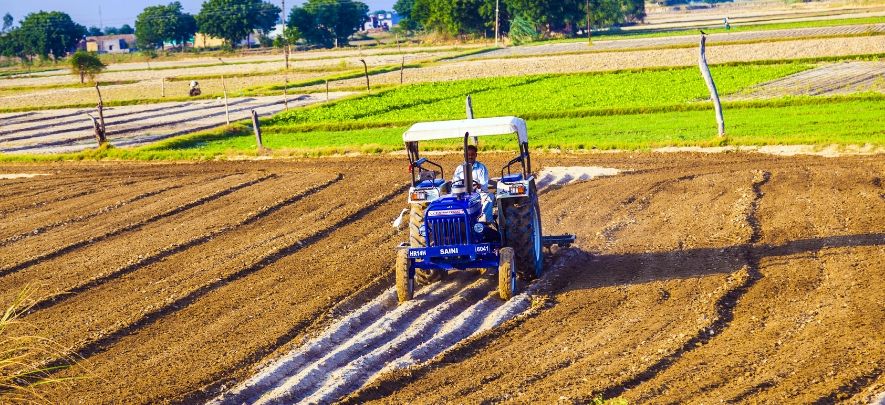Opportunities for SMEs in agriculture

Agriculture
312 week ago — 13 min read
Even though the 21st century is considered the age information technology, agriculture remains the mainstay of human existence and therefore deserves fresh ideas, investment and development.
Presenting excerpts from the report – ‘Agri statups in India’ by the Indian Council of Food & Agriculture (ICFA). The full report is available here.
Agriculture is so entwined with the economy of the world’s largest democracy, that a small dip or rise in the sector has far reaching consequences – economically and politically.
Here is look at some interesting opportunities for startups in the agriculture sector:
Facts about the Indian agriculture sector
- Agriculture is the largest private sector enterprise in India and millions of rural families earn their livelihood from agriculture.
- The sector contributes 18 percent to the GDP.
- At 157.35 million hectares, India cultivates the second largest agricultural land in the world.
- With 20 agri-climatic regions, all 15 major climates in the world exist in India.
India is the largest producer of spices, pulses, milk, tea, cashew and jute; and the second largest producer of wheat, rice, fruits and vegetables, sugarcane, cotton and oilseeds. - Further, India is second in global production of fruits and vegetables and is the largest producer of mango and banana. It also has the highest productivity of grapes in the world.
- India is among the 15 leading exporters of agricultural products in the world.
- Global exports in agricultural products were $1,745 billion in 2013 (Source: WTO-International Trade Statistics 2014).
- India ranks the fifth largest exporter of agricultural products after the US, Brazil, China and Canada. While the US earned only $30 billion from agricultural trade in 2013, India earned as high as $23 billion, thanks to low imports.
Agriculture closely linked with other sectors
Agriculture has a significant social, economic and global footprint. Agriculture is so entwined with the economy of the world’s largest democracy, that a small dip or rise in the sector has far reaching consequences – economically and politically. Agribusiness involves not one but many interlinked industries that complement and supplement each other.
As the scope of agribusiness is expanding, the situation is fertile for new ventures in agriculture. In the last two decades, powered by Government policies and strong engagement of the industry and institutions, agriculture is rapidly evolving into agribusiness in terms of approach and structure.
However, in the last decade, startups are providing the missing links in the agri value chain and delivering efficient products, technologies and services to the farmers on one hand and the consumers on the other hand. According to Agfunder's AgTech Investing Report for 2016, around 53 Indian agritech startups raised Rs 313 million in funding. The report also reveals that India continues to be one of the top six geographies for agritech deals.
Also read: Top 6 trends in the Indian agricultural industry for 2019
Opportunities galore
With increasing mobile penentration and internet coverage, India is witnessing a slow but steady development of startups in the field of agriculture.
Agri-business counselling and guidance
This is envisaged to provide expert services and advice to farmers on cropping practices, technology dissemination, crop protection from pests and diseases, market trends, prices of various crops in the markets and also clinical services for animal health, which would enhance productivity of both crops and animals.
Agri-business counselling and guidance startups are equipped to provide information and guidance on availability of input and its supply, availability of farm equipment on hire and other services. Currently, Krishi Vigyan Kendras (KVKs) provide counselling and guidance at the farm level but the varieties and set of information required every day is difficult to come in the existing system.
Disseminating farm information is an area capitalized by many new ventures. Startups like FreshWorld, Farmily, Awaaz De, Anulekh Agrotech and Sahaja Organics are disseminating farm information through mobile phones, bridging the gaps in agri retail supply chain, providing farmers with direct market access, besides weather, water and soil management services. Awaaz De offers a mobile voice service over mobile phones to small farmers in India, sharing sustainable agriculture practices. The team has initiated a mobile advisory service called Krishi Mobile, wherein agricultural experts send relevant and timely agricultural information covering topics like plant protection, agriculture extension, agronomy, horticulture and animal husbandry, enabling farmers to access this information over the phone.
Warehousing is now seen as an integral part of the supply chain where goods are not only stored for safekeeping but also where other value processes are implemented, thereby, minimising wastage and costs.
Production and marketing
Production and marketing of agriculture produce is another area where agri startups can concentrate. Indian supply chain is inefficient and inadequate. Farmers’ share in the realized price is very less. Many startups have started to work in this area bringing the farmers closer to the consumers. For instance, Bengaluru-based startup Farmily provides micro-sites for farmers to display their farm produce and brings consumers and farmers on a single platform. It allows buyers to order or express interest in purchasing the farmer’s produce on the Farmily platform, immediately upon which an SMS will be delivered to the farmer. Farmers can respond to the demand and will be able to negotiate and conclude deals online. Another Mumbai-based startup, Anulekh Agrotech, founded in 2012 by Sagar Bhansali, sells biocharbased (organic component) products.
Agriculture domain is constantly in need of high-quality inputs, fertilisers and agro-chemicals to improve productivity and yield. Startups could be planned to procure and arrange agri-inputs at the desired end user of this sector. Research shows that farmers are still not able to get agricultural inputs on time like seeds, pesticides, fertilisers and agrochemicals. There is immense scope for agri-market environment analysis, segmentation of agricultural inputs, positioning of agri-products, designing of distribution channels and many other opportunities for startups.
Warehousing
Warehousing in India is a crucial segment in today’s agriculture. Linked critically to food security and agricultural growth, it has yet to develop fully commensurate with India’s demand. Currently, the country has a total agricultural warehousing capacity of around 91 million metric tonnes, to store and conserve large quantities with state agencies. They own 41 percent of the capacity and the balance distributed among private entrepreneurs, cooperative societies, farmers etc. Despite public sector warehousing and private players, including cold chains, millions in farm produce goes to waste every year. To prevent perishability, there is a strong need for startups at the local level to manage farm produce. Over the last two decades, the need for warehousing has also been felt in sectors other than agriculture, such as retail commerce. Warehousing is now seen as an integral part of the supply chain where goods are not only stored for safekeeping but also where other value processes are implemented, thereby, minimising wastage and costs. In fact, warehousing in agriculture is part of the larger agricultural ecosystem. However, just like agriculture, the warehousing market is local, unorganised and fragmented.
Many small and medium landholding farmers use the services of public warehouses, also known as third party logistic companies. These warehouses help farmers by storing and, sometimes, in packing and shipping produce. Warehousing and cold chain co-operatives at the village level; cleaning, processing and packaging of vegetable and fruit by village women at the village level; collection, processing and packaging of milk in different quantities at the local level and building warehouses in co-operation with villagers can be developed within a public-private partnership model.
Also read: Incentivise farming to boost agriculture sector
Agri-Tourism
Another unrecognized field that has immense potential is agri-tourism or eco-tourism. Agri-tourism captures multiple other business opportunities viz. handicrafts, food processing, hospitality and can have significant benefits for local rural areas. Few states in India like Rajasthan, Assam, Haryana, Uttar-Pradesh and Kerala have been trying to attract tourists to their villages and agri-farms but there is still a lack of new entrants as business startups. Developing agri-tourism entrepreneurship in our country may improve economic backwardness in rural and agri-dominated areas. Future agri-tourism startups could provide customers with the opportunity to pick their own farm produce at a savings, to both the customer and the farmer who would normally have to pay for the labour involved. At the same time, this kind of start-up can offer visitors an education in agriculture including how crops are grown and which crops thrive the best in a given climate.
The rural technology business incubator in IIT Madras in Chennai has developed several startups that focus on things like recycling and waste management. Those include Kamal Kisan, a startup that provides farmers with low-cost, quality technology that fits into their existing supply chain, and RainStock, a startup that installs rainwater harvesting systems.
Other interesting startups include SkyMet, a firm that measures weather and the effect of climate changes on agriculture. Its services are affordably priced, and they work with everyone from small farmers to the government. SkyMet is one of the few agtech startups that’s raised funding in India, and its series b round of US$4.5 million was one of the largest in the sector globally this year.
An increasing number of business startups are much needed to help farmers, across the agricultural cycle. The current union budget has very significant allocation of funds to develop the agriculture and allied sector. From ICT apps to farm automation and from weather forecasting to drones and from inputs retailing and equipment renting to online vegetable marketing, and from smart poultry and dairy ventures to smart agriculture and from protected cultivation to innovative food processing and packaging, innovations and technology driven startups are set to revolutionize the food and agriculture sector.
Challenges ahead
Startups inherently have a risk factor associated with it. Agriculture startups hence are more risk prone. Agricultural sector face additional challenges in terms of lack of awareness among startups about possible capital raising options, lack of understanding on part of the investor community as the sector does not have the glamour quotient associated with start-ups in sectors like technology, telecom, entertainment. Besides, the farmers who are the main customers for startups are also skeptical to new innovations. Selling products and technologies to farmers is a big challenge and it is one area where many startups have not figured out a successful model. Aligning with the farmers’ needs and committing to improve productivity is not an easy task.
Besides, regulations in this sector are complicated as agriculture is a state subject with a strong influence from the Central government. This sometimes creates confusion for various stakeholders. Though there is an increasing support from the government, there is limited consistency in the policies followed, which adds to the challenges.
But despite these challenges, entrepreneurs have been able to create innovative companies which are showing a significant traction. The companies are creating innovative solutions which will create a significant value to farmers, investors, entrepreneurs and all stake holders. Good thing about this sector is that the market size is huge, and the problems faced can be solved. If any startup can solve even few of existing problems faced by the sector, it is possible to create multi-billion dollar opportunities.
Also read: The supply chain & its impact on agricultural food waste in India
Source: 'Agri statups in India’ by the Indian Council of Food & Agriculture (ICFA)
Image courtesy: shutterstock.com
To explore business opportunities, link with me by clicking on the 'Connect' button on my eBiz Card.
Disclaimer: The views and opinions expressed in this article are those of the author and do not necessarily reflect the views, official policy or position of GlobalLinker.
Posted by
GlobalLinker StaffWe are a team of experienced industry professionals committed to sharing our knowledge and skills with small & medium enterprises.
View GlobalLinker 's profile
Most read this week
Trending













Comments
Share this content
Please login or Register to join the discussion